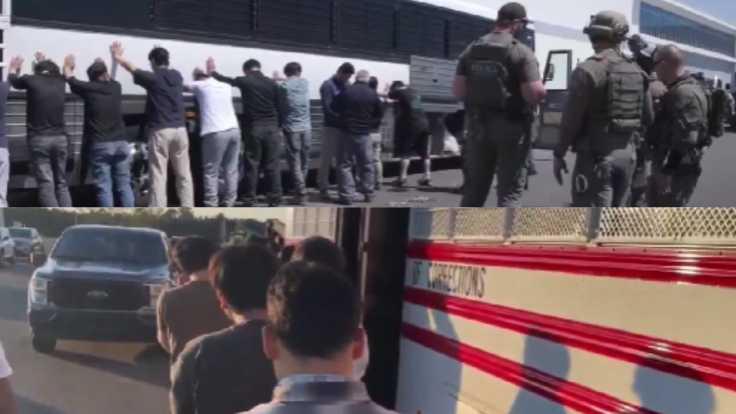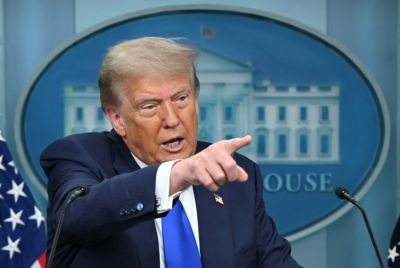'I'm Not Backing Down': Tori Branum, MAGA Supporter Behind Hyundai Plant ICE Tip, Reveals Online Backlash

KEY POINTS
- Tori Branum tipped off ICE, prompting detentions of 475 workers — many South Korean engineers.
- Legal experts say many detained were on valid B-1 visas doing specialized installation work.
- Public outcry includes warnings that the raid threatens US–South Korea economic cooperation.
Tori Branum, a Republican politician and staunch MAGA supporter, has found herself at the centre of an online firestorm after reportedly tipping off US immigration authorities about alleged hiring practices at the new LG Energy Solution–Hyundai battery plant in Georgia. The fallout has become unexpectedly personal, impacting not only her career ambitions but even her underage children.
Branum, a former Marine marksmanship instructor and Republican candidate for Georgia's 12th Congressional District, confirmed she had lodged a tip with US Immigration and Customs Enforcement (ICE), claiming the plant was not employing local workers. "This is what I voted for — to get rid of a lot of illegals," she stated publicly, echoing campaign rhetoric.
A Tidal Wave of Backlash
Since her disclosure, Branum says she has been receiving an increasing volume of phone calls, messages and social posts filled with vitriol.
'I stand up for American workers and expose dangerous conditions that could've cost lives, and suddenly my phone is blowing up,' she posted on Facebook. Amid the barrage, she found bizarre invitations — from anti-racism course registration and LGBTQ parade sponsorship to even a Mormon baptism. Branum characterised it as symptomatic of an orchestrated harassment campaign, noting: "Looks like somebody got hold of my number. Nice try. I'm not backing down."
In a moment of defiance, she shared a photograph of herself armed with an AR-style rifle, captioned: "I'm kinda curious what that was you said in my inbox." The post, now removed, added to the controversy as supporters defended her stance while critics condemned her actions.
Online Attacks and National Debate
Comments online have been scathing. "How dumb do you have to be to ruin a multibillion-dollar contract with Korea because of white supremacy or MAGA hate?" wrote one user, branding her a "Gestapo."
Another questioned the economic fallout: "If Hyundai pulls out of Georgia and we lose 8,500 jobs, who should we thank? Tori is actively fighting working Georgians."
Branum herself pushed back, asserting: "This is proof that people get paid to harass. My phone has been ringing nonstop with vile voicemails." She described the messages, many apparently from teenagers, as "angry, immature" and ultimately laughable.
'They Worked on Business Visas'
The controversy began after an ICE operation at the Hyundai plant in western Savannah resulted in the detention of 475 employees, more than 300 of whom were South Korean nationals. Disturbing footage surfaced showing many of them shackled in chains at their hands, ankles and waists.
Atlanta immigration attorney Charles Kuck, representing several of the detained workers, pointed out that many were present under legitimate B-1 business visas. They had come for essential tasks such as engineering and equipment installation — crucial for bringing the battery plant online — roles with no ready American alternative.
As of press time, Kang Hoon-sik, chief of staff to South Korean President Lee Jae Myung, confirmed that South Korea and the United States had finalised negotiations for the release of the detained workers.
A charter flight is being arranged to bring the South Korean nationals home once remaining administrative steps are completed. Seoul's Foreign Ministry also announced that Foreign Minister Cho Hyun would depart for the US on Monday afternoon to discuss the terms of their release, which officials say will be on a voluntary basis.
Diplomatic And Economic Repercussions
US President Donald Trump publicly backed the crackdown despite the online backlash, emphasising that US experts should be trained to fill the roles played by the Korean engineers.
The defense attorney noted that replacing skilled personnel can take years. Critics warn that the raid could destabilise South Korean investment; their Foreign Ministry dispatched envoys to secure the return of their citizens, framing the incident as a diplomatic crisis.
The raid and ensuing backlash highlight growing tensions between immigration policy enforcement and global business partnerships. The Hyundai plant, a key element in the US–South Korea trade relationship, now stands at risk of becoming an economic casualty of domestic political pressure.
Critics argue that Branum's actions, while framed as patriotic, may do more harm than good — potentially costing thousands of Georgia jobs and weakening South Korea's confidence in investing. Her post sparked fierce ripostes such as, "If Hyundai walks, who should we blame? Tori."
Branum's defiant stance energises her base but raises the stakes politically. The ICE raid has thrust immigration enforcement into the spotlight, intertwining it with fragile trade balances and international diplomacy.
Observers note the raid follows closely on the heels of Trump and Lee's high-profile bilateral meeting in Washington last August 25 which was intended to boost trade, tariffs and investments. Some analysts say blocking or chasing off key foreign labour can jeopardise broader policy goals, even those shared by the administration.
A Diplomatic Tightrope
South Korea's own leadership is walking a tightrope. President Lee is navigating between building closer US ties as a mantle of security against North Korea and safeguarding their country's political credibility at home.
In Washington, allies and adversaries alike are watching. The raid underscores how domestic policy decisions — however well-intended in domestic political theatre — can ripple across the geopolitical stage, affecting alliances and economic partnerships. Analysts say Tori Branum's simple attempt to fight for immigration law now risks splintering a prized US–South Korea economic alliance.
© Copyright IBTimes 2025. All rights reserved.





















